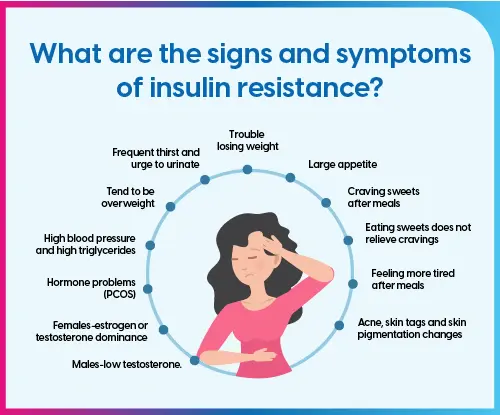The Surprising Connection: Insulin Resistance, Diabetes, and Cognitive Decline
When managing insulin resistance our dietary choices play a pivotal role. A nutrient-dense diet can regulate insulin levels

Have you ever stopped to consider the intricate web of connections that exist within our bodies? Unravel how seemingly unrelated conditions can intertwine, influencing our overall well-being.
In this article we explore the remarkable link between insulin resistance, diabetes, and cognitive decline – a connection that demands our attention and understanding. Insulin resistance plays a pivotal role in this intricate relationship, and grasping its implications can empower us to take proactive steps towards safeguarding our cognitive health.
Symptoms of Insulin Dysregulation
Insulin resistance is often a silent condition, and you will require a blood test to check your blood sugar levels. The following telltale signs should not be ignored:
- Excessive hunger and thirst: Your body struggles to utilize glucose efficiently, leading to persistent cravings.
- High Blood Pressure - 130/80 or higher
- Fatigue and lack of energy: Insulin resistance can zap your energy levels, leaving you drained.
- A waistline over 40 inches in men and 35 inches in women
- Frequent urination: When glucose builds up in your bloodstream, your kidneys work overtime to flush it out.
- Skin Tags or patches of dark, velvety skin under your arms or on your neck
- Blurred vision: High blood sugar can cause fluid shifts, affecting your eyesight temporarily.
- Slow wound healing: Poor circulation and impaired immune function can hinder healing.
- Unexplained weight changes: Insulin resistance can cause either weight gain or loss, depending on the individual.

This Condition is More Likely if you have the following:
- Excess weight, especially around the belly
- Inactive lifestyle
- A diet high in carbohydrates
- Skin tags or patches of dark, velvety skin under your arms or on your neck
- Fatty Liver Disease
- A family history of diabetes
- Polycystic ovary syndrome (PCOS) - most people with PCOS are insulin resistant.
- Smoke cigarettes
- Certain racial or ethnic backgrounds: Black, Asian American, or Hispanic/Latino. Indigenous people from Alaska, the continental U.S., and the Pacific Islands are also at high risk
- Sleep Apnea
- Some hormonal disorders like Cushing's syndrome, acromegaly, and hypothyroidism; and inherited conditions including myotonic dystrophy
- Medications like steroids, some HIV treatments, and certain blood pressure medicines
- Inherited conditions including myotonic dystrophy and inherited lipodystrophy
Recognizing these symptoms early on can be crucial in addressing the underlying issue of insulin resistance and mitigating its potential impact on cognitive function.

Nutrition for Insulin Resistance
When managing insulin resistance, our dietary choices play a pivotal role. A balanced and nutrient-dense diet can help regulate insulin levels and reduce the risk of developing diabetes and its associated complications. The following are some key nutritional considerations:
- Whole Grains: Rich in fibre, B vitamins and other nutrients and can reduce inflammation in the brain, supporting memory and warding off dementia. Quinoa, barley, brown rice and oats are great choices and are healthier alternatives to more processed grains, such as white flour.
- Lean Proteins: Incorporate lean proteins such as chicken, fish, and legumes into your meals, as they can help promote satiety and support muscle growth.
- Fruits and Vegetables: Load up on a variety of colourful fruits and vegetables, which are packed with essential vitamins, minerals, and antioxidants that support overall health.
- Avoid Sugary Drinks and Processed Foods: Steer clear of sugary beverages and highly processed foods, as they can spike insulin levels and contribute to insulin resistance.
- Follow a Mediterranean Diet: Backed by science for boosting brain health and reducing your risk of dementia, focus on eating plenty of fruit and vegetables, seafood, olive oil, nuts, seeds, beans, legumes, and whole grains
By making mindful dietary choices, you can actively support your body's ability to regulate insulin levels, thereby reducing the risk of developing diabetes and its associated cognitive impacts.
Reversing Insulin Resistance and Diabetes: Unlocking the Path to Better Health
Combating insulin resistance and diabetes requires a multi-faceted approach. While dietary changes are crucial, other lifestyle modifications can also play a pivotal role:
- Regular Exercise: Physical activity helps improve insulin sensitivity and promotes weight management.
- Stress Management: Chronic stress can exacerbate insulin resistance, so finding healthy ways to manage stress is essential.
- Quality Sleep: Ensure you get sufficient quality sleep
- Challenge Your Brain: Engage in a variety of puzzles, sudoku and other games that make you solve problems
- Weight Management: Losing excess weight, especially around the abdominal area, can significantly improve insulin sensitivity.
- Medication and Supplements: In some cases, prescribed medications or supplements may be necessary under the guidance of a healthcare professional
- Foods to Limit: Red meats, processed foods, refined grains and oils, and high-sugar foods.
- Foods to eat in Moderation: Poultry, eggs, dairy, and red wine
"Success stories abound, proving that lifestyle changes can reverse insulin resistance and diabetes, paving the way for better overall health and reduced risk of cognitive decline."

Common Dementia Triggers
There is no single "number one" trigger for dementia behaviour, as the behaviours associated with dementia can arise from various underlying causes and factors. However, some of the most common triggers or contributing factors include:
- Unmet needs: People with dementia may exhibit challenging behaviours due to unmet physical, emotional, or social needs, such as pain, hunger, thirst, discomfort, loneliness, or boredom.
- Communication difficulties: As dementia progresses, individuals may have difficulty expressing their needs, thoughts, or feelings, leading to frustration and behavioural changes.
- Environmental factors: Unfamiliar or overstimulating environments, noise, poor lighting, or confusing surroundings can increase confusion and agitation in people with dementia.
- Medication side effects: Some medications used to treat other conditions or dementia symptoms can cause side effects that contribute to behavioural changes.
- Psychological and emotional factors: Depression, anxiety, fear, or past traumatic experiences can influence the behaviours of individuals with dementia.
- Underlying medical conditions: Infections, constipation, dehydration, or other medical issues can trigger or exacerbate behavioural symptoms in people with dementia.
It is important to note that every person exhibits unique behaviours influenced by various factors. Understanding and addressing the underlying causes through personalized care approaches, environmental modifications, and effective communication strategies can help manage and reduce challenging behaviours associated with dementia.
Did You Know? Herpes Simplex Virus and Dementia
Recent research has shed light on a potential link between the herpes simplex virus (HSV) and an increased risk of developing dementia, particularly Alzheimer's disease. While the exact mechanisms behind this connection are still being investigated, several theories suggest a potential role of HSV in cognitive decline:
- Inflammation: HSV can trigger chronic inflammation in the brain, which has been associated with an increased risk of developing Alzheimer's disease.
- Direct Neuronal Damage: Some studies suggest that HSV may directly infect and damage neurons, potentially contributing to cognitive impairment.
- Viral Reactivation: In individuals with a weakened immune system, such as those with diabetes, HSV may reactivate and cause further neurological complications.
While more research is needed to understand the relationship between HSV and dementia, this emerging study highlights the importance of maintaining a strong immune system and exploring potential preventive measures.
The intricate connection between insulin resistance, diabetes, and cognitive decline is a compelling reminder of the intricate web of influences that shape our overall health and well-being.
By understanding the role of insulin resistance and taking proactive steps to manage it through a balanced diet, regular exercise, and stress reduction, we can potentially reduce the risk of developing diabetes and its associated cognitive impacts.






